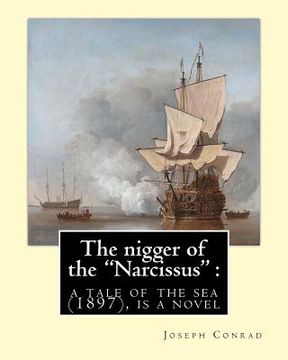The nigger of the "Narcissus": a tale of the sea (1897) is a novella by Joseph: Joseph Conrad (Polish pronunciation: born Jozef Teodor Konrad Korzeni (en Inglés)
Reseña del libro "The nigger of the "Narcissus": a tale of the sea (1897) is a novella by Joseph: Joseph Conrad (Polish pronunciation: born Jozef Teodor Konrad Korzeni (en Inglés)"
The Nigger of the 'Narcissus': A Tale of the Sea (1897) is a novella by Joseph Conrad. Because of its quality compared to earlier works, some have described it as marking the start of Conrad's major, or middle, period;others have placed it as the best work of his early, or first, period. Preface--The author's preface to the novel, regarded as a manifesto of literary impressionism, is considered one of Conrad's most significant pieces of non-fiction writing.This preface begins with the line: "A work that aspires, however humbly, to the condition of art should carry its justification in every line". **Plot** The title character, James Wait, is a dying West Indian black sailor on board the merchant ship Narcissus sailing from Bombay to London. Wait, suffering from tuberculosis, becomes seriously ill during the voyage, and his plight arouses the humanitarian sympathies of many of the crew. However, the ship's master Captain Alistoun and an old sailor named Singleton remain concerned primarily with their duties and appear indifferent to Wait's condition. Off the Cape of Good Hope the ship capsizes onto her beam-ends with half her hull submerged, and the crew clings onto the deck for an entire night and day, waiting in silence for the ship to turn over the rest of the way and sink. Alistoun refuses to allow the masts to be severed, which might allow the hull to right itself. Five of the men, realizing that Wait is unaccounted for, climb down to his cabin and rescue him at their own peril. When the storm passes and a wind returns, Alistoun directs the weary men to catch the wind, which succeeds in righting the ship. Later in the voyage Alistoun prevents a near-mutiny led by a slippery Cockney named Donkin. Wait eventually succumbs and dies within sight of land, as Singleton had predicted he would. **History** The work, written in 1896 and partly based on Conrad's experiences of a voyage from Bombay to London, began as a short story but developed into a novella of some 53,000 words. As it grew, Conrad began to think of its being serialized. After Smith Elder had rejected it for the Cornhill Magazine, William Ernest Henley accepted it for the New Review, and Conrad wrote to his agent, Garnett, "Now I have conquered Henley, I ain't 'fraid o' the divvle himself!" Some years later, in 1904, Conrad described this acceptance as "the first event in my writing life which really counted".In the United States, the novel was first published under the title The Children of the Sea: A Tale of the Forecastle, at the insistence by the publisher, Dodd, Mead and Company, that no one would buy or read a book with the word "nigger" in its title, not because the word was deemed offensive, but because a book about a black man would not sell.In 2009, WordBridge Publishing published a new edition titled The N-Word of the Narcissus, which completely excised the word "nigger" from the text. According to the publishers, the offensive word may have led readers to avoid the book, and thus by getting rid of it the work was made more accessible.[8] Although praised by some, others denounced the change as censorship. Joseph Conrad (Polish pronunciation: born Jozef Teodor Konrad Korzeniowski; 3 December 1857 - 3 August 1924) was a Polish-British writer regarded as one of the greatest novelists to write in the English language.He joined the British merchant marine in 1878, and was granted British nationality in 1886. Though he did not speak English fluently until he was in his twenties, he was a master prose stylist who brought a non-English sensibility into English literature. He wrote stories and novels, many with a nautical setting, that depict trials of the human spirit in the midst of an impassive, inscrutable universe. Conrad is considered an early modernist, though his works still contain elements of 19th-century realism. ....

